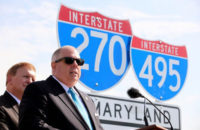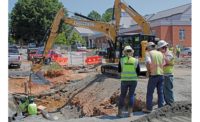A proposed $2-billion sports-centered development in Alexandria, Va., faces an uncertain future after state lawmakers declined to include provisions for public funding in the FY 2024-2026 budget.
Announced last December by Virginia Gov. Glenn Youngkin (R) and Monumental Sports and Entertainment CEO Ted Leonsis, the proposal would have created a new entertainment district in the Potomac Yards area, centered around a new home for Washington, D.C.’s professional basketball and hockey teams, which currently occupy a downtown arena built in 1997. The 70-acre site would also include a headquarters campus for Monumental, as well as a basketball practice facility, performing arts venue, expanded esports facility, hotels, retail, restaurants, conference and community gathering spaces.
The public-private partnership’s funding plan called for $1.5-billion in city- and state-issued bonds, with the City of Alexandria and Monumental the remaining share. The bonds were to be repaid through a project revenues such as lease payments, site-specific taxes and naming rights.
The proposal had been viewed as an opportunity to capitalize on the intense redevelopment of the adjacent National Landing neighborhood, anchored by Amazon’s east coast headquarters, as well as the close proximity of Washington Reagan National Airport. The teams were to move to the arena by 2028 if the plan moved forward.
Despite an Alexandria-funded economic study projecting nearly $30 million annually in new local tax revenue from the new district, however critics feared the announced $2-billion price tag did not reflect the actual cost. They also faulted the plan’s heavy reliance on local- and state-backed bonds, which posed an unreasonable risk to taxpayers should the development fail to live up to economic expectations. Monumental’s commitment to hire union labor for the arena also failed to win over groups such as the Northern Virginia AFL-CIO, which claimed the development plan lacked sufficient worker protections, particularly for the district’s privately financed elements.
There had been speculation that arena opponents in Virginia’s Democrat-controlled legislature might consider endorsing the plan in exchange for Youngkin’s backing of other measures, such as additional funding for the Metrorail system in Northern Virginia. Ultimately, negotiators in both the state Senate and House of Delegates dropped language establishing an authority to issue bonds for the district from the state’s two-year $188-billion budget, which was passed prior to adjournment on March 9.
Virginia law gives Youngkin options to revive the plan, either by asking for an amendment to restore the bonding authority to the current budget, which would be considered at an April legislative session. He could also convene a special session of the legislature solely to reconsider the proposal.





Post a comment to this article
Report Abusive Comment